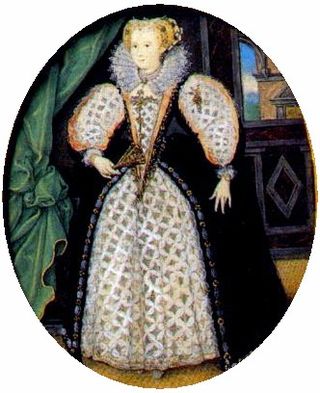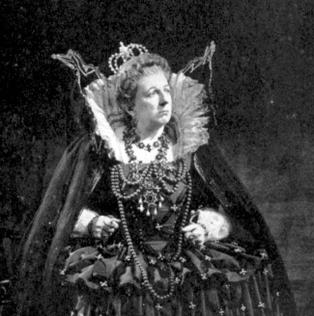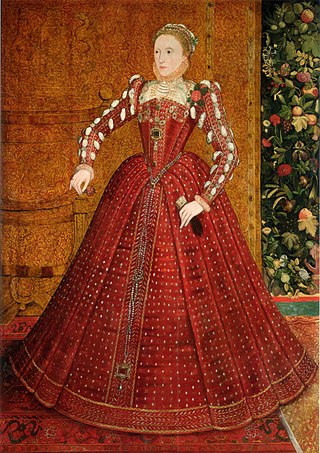
Robert Devereux, 2nd Earl of Essex, KG, PC was an English nobleman and a favourite of Queen Elizabeth I. Politically ambitious, and a committed general, he was placed under house arrest following a poor campaign in Ireland during the Nine Years' War in 1599. In 1601, he led an abortive coup d'état against the government of Elizabeth I and was executed for treason.

Sir Peter Neville Luard Pears was an English tenor. His career was closely associated with the composer Benjamin Britten, his personal and professional partner for nearly forty years.

Roberto Devereux is a tragedia lirica, or tragic opera, by Gaetano Donizetti. Salvadore Cammarano wrote the Italian libretto after François Ancelot's tragedy Elisabeth d'Angleterre (1829), and based as well on the Historie secrete des amours d'Elisabeth et du comte d'Essex (1787) by Jacques Lescène des Maisons. Devereux was the subject of at least two other French plays: Le Comte d'Essex by Thomas Corneille and Le Comte d'Essex by Gauthier de Costes, seigneur de la Calprenède.

The Private Lives of Elizabeth and Essex is a 1939 American historical romantic drama film directed by Michael Curtiz and starring Bette Davis, Errol Flynn, and Olivia de Havilland. Based on the play Elizabeth the Queen by Maxwell Anderson—which had a successful run on Broadway with Lynn Fontanne and Alfred Lunt in the lead roles—the film fictionalizes the historical relationship between Queen Elizabeth I and Robert Devereux, 2nd Earl of Essex. The screenplay was written by Norman Reilly Raine and Aeneas MacKenzie.

Peter Grimes, Op. 33, is an opera in three acts by Benjamin Britten, with a libretto by Montagu Slater based on the section "Peter Grimes", in George Crabbe's long narrative poem The Borough. The "borough" of the opera is a fictional small town that bears some resemblance to Crabbe's – and later Britten's – home of Aldeburgh, Suffolk, on England's east coast.

Penelope Rich, Lady Rich, later styled Penelope Blount was an English court office holder. She served as lady-in-waiting to the English queen Anne of Denmark. She was the sister of Robert Devereux, 2nd Earl of Essex, and is traditionally thought to be the inspiration for "Stella" of Sir Philip Sidney's Astrophel and Stella sonnet sequence. She was married to Robert Rich, 3rd Baron Rich and had a public liaison with Charles Blount, Baron Mountjoy, whom she married in an unlicensed ceremony following her divorce from Rich. She died in 1607.
Dame Josephine Clare Barstow, is an English operatic soprano.

Merrie England is an English comic opera in two acts by Edward German to a libretto by Basil Hood. The patriotic story concerns love and rivalries at the court of Queen Elizabeth I, when a love letter sent by Sir Walter Raleigh to one of Queen Elizabeth's ladies-in-waiting, Bessie Throckmorton, ends up in the hands of the Queen. Well-known songs from the opera include "O Peaceful England", "The Yeomen of England" and "Dan Cupid hath a Garden".

Elizabeth Harwood was an English lyric soprano. After a music school, she enjoyed an operatic career lasting for over two decades and worked with such conductors as Colin Davis and Herbert von Karajan. She was one of the few English singers of her generation to be invited to sing in productions at the Salzburg Festival and La Scala, Milan, as well as at the Metropolitan Opera.

Joan Cross was an English soprano, closely associated with the operas of Benjamin Britten. She also sang in the Italian and German operatic repertoires. She later became a musical administrator, taking on the direction of the Sadler's Wells Opera Company.
Jennifer Vyvyan was a British classical soprano who had an active international career in operas, concerts, and recitals from 1948 up until her death in 1974. She possessed a beautifully clear, steady voice with considerable flexibility in florid music. She was praised for her subtle phrasing and her dramatic gifts enabled her to create vivid individual portrayals. Although she sang a broad repertoire, she is particularly remembered for her association with the works of Benjamin Britten; notably singing roles created for her in the world premieres of several of his operas with the English Opera Group.

Elizabeth I of England has inspired artistic and cultural works for over four centuries. The following lists cover various media, enduring works of high art, and recent representations in popular culture, film and fiction. The entries represent portrayals that a reader has a reasonable chance of encountering rather than a complete catalogue.

Edith Mary Coates OBE was an English operatic mezzo-soprano. After studying in London at Trinity College of Music she joined Lilian Baylis's theatre company at the Old Vic in 1924 and then became a chorus member of Baylis's opera company. By the time the latter moved to Sadler's Wells Theatre in 1931 Coates had become its principal mezzo-soprano, and she sang in a wide range of roles, in the Italian, French, German, Russian and other repertoires.
Rae Woodland was a British soprano who studied with Roy Henderson. Her debut was as Queen of the Night at Sadlers Wells. She sang in many European festivals, and debuted at Covent Garden in La sonnambula with Joan Sutherland and Luciano Pavarotti. She was first asked to sing for Benjamin Britten on the English Opera Group's tour of Russia, and played many roles for him subsequently. She also created roles for Gottfried von Einem, Nicholas Maw and Sir Arthur Bliss, and made many live broadcasts for the BBC, from the RAH Proms to Friday Night is Music Night. She retired from the opera stage in 1984. She then taught singing at the Royal Academy of Music in London, and at the Britten-Pears School in Snape Maltings on the invitation of Sir Peter Pears.
Variations on an Elizabethan Theme is a set of variations for string orchestra, written collaboratively in 1952 by six English composers: Lennox Berkeley, Benjamin Britten, Arthur Oldham, Humphrey Searle, Michael Tippett and William Walton.
Neil Howlett was an English operatic baritone who sang leading roles in major opera houses and festivals in the UK and abroad, including the Royal Opera House, Teatro Colón, and the English National Opera, where he was the Principal Baritone for seventeen years. Described by John Steane as "a vibrant voice somewhat in the Amato/Franci line", Howlett's repertoire included over 80 roles.

Anne Sharp was a Scottish coloratura soprano particularly associated with the operas of Benjamin Britten.
Ava June Wiggins was an English opera singer noted for her roles with the Sadler's Wells Opera. She joined the Opera in 1953 and switched from a mezzo to soprano on the persuasion of her teacher Clive Carey. June left the company in 1963 and also won a gold medal at the Sofia International Competition for young opera singers. She rejoined Sadler's Wells Opera seven years later and made her first performance in the United States in 1974 with the San Francisco Opera. June's last professional appearance as a singer came in 1983 and retired the following year to enter into a coaching role for the next generation of singers. She also taught with various musical organisations and brought her opera experience to directing productions until 1999.
Elizabeth Vaughan is a Welsh soprano, later a mezzo-soprano.
Basil Woore Coleman was an English producer, director, and actor. He was a prolific director of opera, stage plays, and television productions, known for his 1977 BBC television adaption of Anna Karenina and his involvement with the first productions of several operas by Benjamin Britten, including The Turn of the Screw (1954), Gloriana (1953), Billy Budd (1951), and The Little Sweep (1949).












